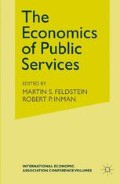Abstract
The use of intergovernmental grants is found in most countries. Governments (especially central governments) that encompass relatively large jurisdictions frequently supplement with grants of funds the revenues of public units at more decentralised levels. These grants are of two basic types: conditional and unconditional (‘lump-sum’). Among the former, a common type is the matching grant, where the recipient government is required to allocate funds from its own sources, in a specified ratio to the grant.
Access this chapter
Tax calculation will be finalised at checkout
Purchases are for personal use only
Preview
Unable to display preview. Download preview PDF.
References
Barlow, R., ‘Efficiency Aspects of Local School Finance’, Journal of Political Economy, LXXVIII (1970), pp. 1028–40.
Boskin, M., ‘Local Government Tax and Product Competition and the Optimal Provision of Public Goods’, Journal of Political Economy, LXXXI (1973), pp. 203–10.
Bradford, D., and Oates, W. E., ‘Towards a Predictive Theory of Intergovernmental Grants’, American Economic Review, Papers and Proceedings, May 1971, pp. 440–8.
Bradford, D., and Oates, W. E., ‘The Analysis of Revenue-Sharing in a New Approach to Collective Fiscal Decisions’, Quarterly Journal of Economics, LXXXV (1971), pp. 416–39.
Brainard, W., and Dolbear, F. T., ‘The Possibility of Oversupply of Local Public Goods: A Critical Note’, Journal of Political Economy, LXXV (1967), pp. 86–90.
Edelson, N., Budgetary Outcomes in a Referendum Setting, Discussion Paper no. 244, Department of Economics, University of Pennsylvania (Philadelphia, Oct 1972).
Oates, W. E., Fiscal Federalism (New York: Harcourt, Brace, Jovanovich, 1972).
Sheshinski, E., ‘The Supply of Communal Goods and Community Size’, Department of Economics, The Hebrew University of Jerusalem (Mar 1974).
Thurow, L., ‘The Theory of Grants in Aid’, National Tax Journal, XIX (1966), pp. 373–7.
Tiebout, C., ‘The Pure Theory of Local Expenditures’, Journal of Political Economy, LXIV (1956), pp. 416–24.
Wilde, J., ‘The Expenditure Effects of Grants in Aid Programs’, National Tax Journal, XXI (1968), pp. 340–8.
Author information
Authors and Affiliations
Editor information
Editors and Affiliations
Copyright information
© 1977 International Economic Association
About this chapter
Cite this chapter
Sheshinski, E. (1977). The Supply of Communal Goods and Revenue Sharing. In: Feldstein, M.S., Inman, R.P. (eds) The Economics of Public Services. International Economic Association Conference Volumes. Palgrave Macmillan, London. https://doi.org/10.1007/978-1-349-02917-4_11
Download citation
DOI: https://doi.org/10.1007/978-1-349-02917-4_11
Publisher Name: Palgrave Macmillan, London
Print ISBN: 978-1-349-02919-8
Online ISBN: 978-1-349-02917-4
eBook Packages: Palgrave Economics & Finance CollectionEconomics and Finance (R0)

